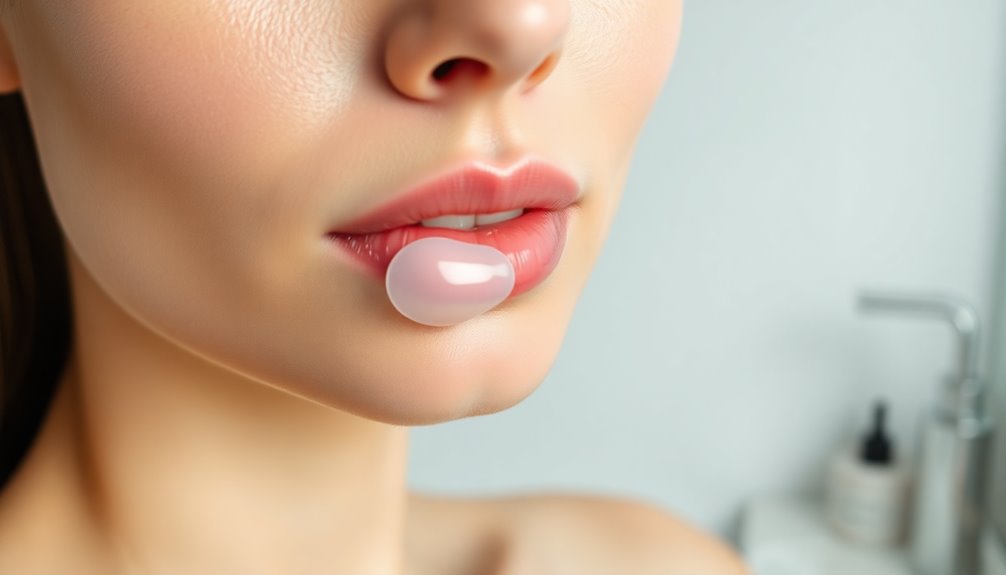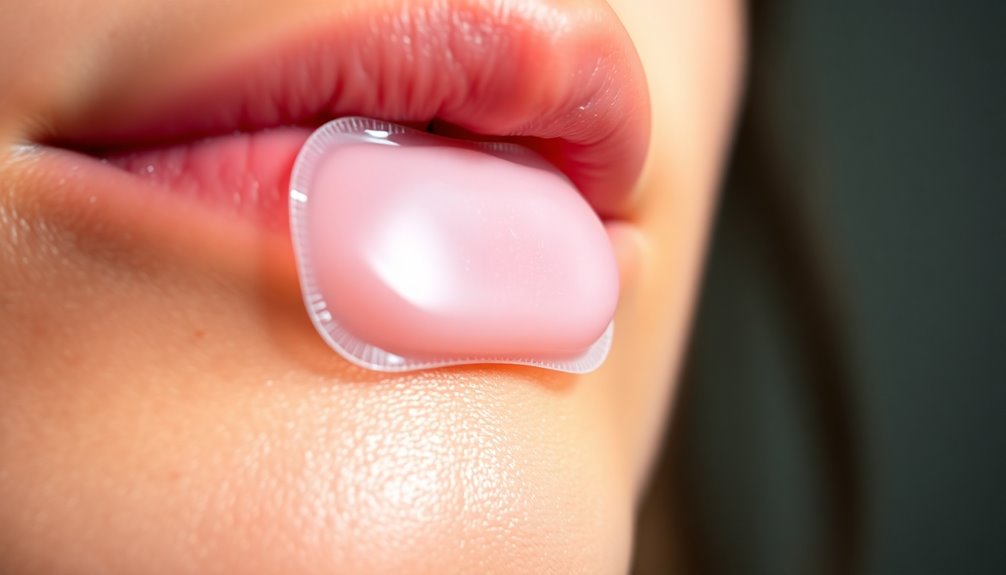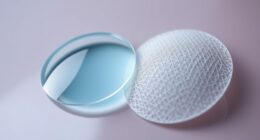Pimple patches don't work for cold sores. They're designed to absorb oil and pus from pimples, not treat viral infections. Cold sores need antiviral meds, as the patches lack the necessary properties to combat the herpes simplex virus. Plus, the adhesive can irritate the sensitive skin around cold sores and may prolong healing. If you want to understand more about effective treatments for cold sores, there are options that can help speed up recovery and soothe the area.
Key Takeaways
- Pimple patches are ineffective for cold sores since they lack antiviral properties necessary to treat viral infections.
- Designed for acne, pimple patches may irritate the sensitive skin surrounding cold sores.
- The moist environment created by pimple patches can prolong cold sore healing and potentially spread the virus.
- Antiviral medications are the recommended treatment for cold sores, not pimple patches.
- Cold sore patches specifically designed for viral infections can protect and aid in healing more effectively than pimple patches.
Understanding Pimple Patches and Their Composition

Pimple patches, often overlooked, are handy tools in acne treatment. These small, adhesive dressings absorb excess oil and pus, protecting your skin from bacteria and debris.
Pimple patches are effective, adhesive dressings that absorb oil and pus while shielding your skin from bacteria.
Typically made from hydrocolloid material, they create a moist environment that promotes healing and reduces inflammation. Common ingredients include salicylic acid, known for unclogging pores, and tea tree oil, which fights acne-causing bacteria. Additionally, tea tree oil has strong antibacterial properties that enhance its effectiveness in treating acne.
Some patches also feature pectin and gelatin for enhanced fluid absorption, while others use a polyurethane film as a protective barrier.
While they're effective for surface-level pimples, they aren't suitable for cystic acne. Using pimple patches can lead to quicker healing and prevent scarring, making them a valuable addition to your skincare routine.
The Difference Between Cold Sores and Pimples

While both cold sores and pimples can cause discomfort and concern, they stem from very different origins and require distinct treatment approaches.
Cold sores are caused by the herpes simplex virus, making them contagious and often triggered by stress or sunlight. You'll notice cold sores starting with a tingling sensation, leading to fluid-filled blisters. Most people acquire HSV-1 during childhood from non-sexual contact, which highlights the virus's widespread nature.
On the other hand, pimples arise from bacterial overgrowth, often linked to hormonal changes and clogged pores. Pimples appear as pus-filled bumps and can happen anywhere on your skin.
Their treatments also differ: cold sores need antiviral medications, whereas pimples typically respond to antibacterial agents. Understanding these differences is essential for effective management and prevention of both conditions.
Why Pimple Patches Are Not Suitable for Cold Sores

Understanding the differences between cold sores and pimples highlights why pimple patches aren't a suitable treatment for cold sores.
Pimple patches lack the antiviral properties needed to combat the herpes simplex virus that causes cold sores. They're designed for acne, not viral infections, so they don't provide any therapeutic benefits. Additionally, using these patches can create a moist environment that may actually prolong healing and increase the risk of spreading the infection. The adhesive can irritate the sensitive skin around cold sores, causing more discomfort and potentially delaying healing. Moreover, antiviral medications are the primary treatment for managing cold sores, further emphasizing the ineffectiveness of pimple patches.
Recommended Treatments for Cold Sores

When cold sores strike, it's crucial to know the best treatments available to speed up healing and alleviate discomfort. Antiviral medications like Acyclovir and Valacyclovir can greatly reduce healing time. Topical options such as Penciclovir and Docosanol may also help. Cold sore patches provide protection and speed healing, while natural remedies like aloe vera gel and manuka honey soothe the area. Sunscreen can also be applied to protect against sunburn, which can trigger further outbreaks. For immediate relief, applying ice or a cold compress can reduce swelling. Over-the-counter pain relievers, antiseptic ointments, and moisturizing creams keep the area clean and comfortable. To prevent future outbreaks, consider stress reduction techniques, a balanced diet, and adequate sleep to boost your immune system.
The Importance of Choosing the Right Patch for Skin Issues

Choosing the right patch for your skin issues is essential for effective treatment and comfort. Not all patches are created equal, so understanding what you need can make a difference.
Here are three key factors to take into account:
- Active Ingredients: Choose patches with ingredients specifically designed for your condition, like antiviral agents for cold sores. Additionally, selecting patches with active ingredients that promote skin rejuvenation can enhance the overall effectiveness of the treatment.
- Adhesive Quality: Make certain the patch has skin-friendly adhesives to avoid irritation and guarantee it stays in place.
- Skin Type Compatibility: Select a patch that suits your skin type and sensitivity to prevent allergic reactions or discomfort.
Frequently Asked Questions
Can Pimple Patches Prevent the Spread of Cold Sores?
No, pimple patches can't prevent the spread of cold sores.
They're designed for acne, not viral infections, so they lack the necessary antiviral properties. If you apply a pimple patch to a cold sore, you might risk spreading the virus further.
Instead, focus on proper hygiene and use antiviral treatments specifically made for cold sores.
Keeping your immune system strong and avoiding personal item sharing will also help prevent transmission.
How Long Should I Leave a Pimple Patch On?
Think of a pimple patch as a tiny superhero for your skin, ready to battle breakouts.
You should leave it on for about 4 to 8 hours, letting it work its magic. If you're facing a more stubborn pimple, you can extend that to 24 hours.
Just remember to replace it if it gets saturated, ensuring it stays effective.
Your skin will thank you for giving it the time it needs to heal!
Are There Side Effects of Using Pimple Patches?
Yes, there are side effects of using pimple patches.
You might experience redness and irritation, especially if you have sensitive skin.
Some patches can cause dryness and peeling due to their medicated ingredients.
Allergic reactions to adhesives are also possible.
In rare cases, prolonged use might lead to blisters or ulcers.
It's crucial to monitor your skin's response and discontinue use if you notice any adverse effects.
Always read the instructions for best results.
Can I Use Pimple Patches on Other Skin Conditions?
Sure, you could use pimple patches on other skin conditions—if you enjoy experimenting with mismatched solutions!
However, these patches are specifically designed for acne. Using them on other issues mightn't only be ineffective but could also worsen your skin's condition.
Each skin problem needs tailored treatments, so it's best to consult a dermatologist for the right approach.
What Ingredients Should I Look for in Cold Sore Patches?
When choosing cold sore patches, look for key ingredients like hydrocolloid gel, which keeps the area moist and promotes healing.
Active gel technology helps accelerate your skin's natural recovery process.
You'll also want a semi-permeable membrane to protect the sore while allowing it to breathe.
Ultra-adhesive properties are essential too, ensuring the patch stays securely in place.
These features can considerably enhance the effectiveness of your treatment and speed up healing.
Conclusion
In the grand symphony of skincare, pimple patches may hit the right notes for acne but falter when faced with the cold sore crescendo. They're not your go-to solution for those pesky blisters, as they lack the magic to soothe and heal. Instead, embrace treatments tailored to cold sores, allowing your skin to dance back to harmony. Remember, choosing the right remedy is like picking the perfect instrument — it makes all the difference in the melody of your skin's health.








